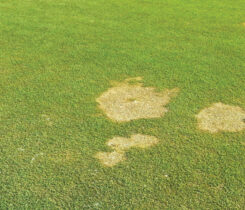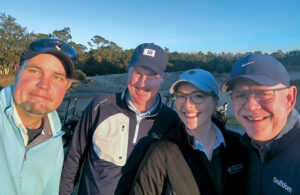A closer look at the EPA’s pesticide registration programs with RISE President Megan J. Provost
The Environmental Protection Agency’s (EPA) pesticide registration program is changing to meet Endangered Species Act (ESA) consultation obligations under the Federal Insecticide, Fungicide and Rodenticide Act (FIFRA). While the primary focus is on agricultural applications, we anticipate impacts on non-agricultural applications — including golf course management — as the process evolves.

Megan J. Provost
The changes that will impact pesticide applicators and superintendents are happening at an unprecedented pace due to the EPA settling a major lawsuit that challenged the agency’s process. With hundreds of species across our nation listed as either endangered or threatened, we anticipate an impact on our ability to keep green spaces like golf courses maintained and safe from pests.
Under the ESA, federal agencies are required to ensure actions taken or permitted by the federal government do not compromise threatened species or their habitats. In recent years, the EPA has faced numerous lawsuits alleging its failure to fulfill ESA obligations. As a result of these legal challenges, the EPA settled several cases, resulting in the agency agreeing to reevaluate its approach to further comply with ESA obligations within its pesticide registration program.
The EPA published draft strategies for herbicides and a vulnerable species pilot, with future strategies anticipated for rodenticides, insecticides and fungicides. These strategies focus on mitigations to manage potential pesticide exposure to endangered species.
Now that it’s time for change, the voices of the golf industry must be heard. Awareness, representation and education surrounding these changes are essential to developing practical and sustainable solutions that balance species protection and effective pest management.
We are working with national partners to ensure the EPA hears directly from applicators about their best management practices and the unique nature of non-agricultural pesticide applications. These conversations are essential to ensuring any mitigations are appropriate to the use pattern.
In 2022, the EPA released a work plan outlining new pesticide evaluation strategies to improve outcomes for vulnerable species by assessing active ingredients, mitigation techniques and use patterns. As a first step in this process, the EPA launched pilot programs to evaluate the ecological risk of several active ingredients in pesticide products on vulnerable species.
With those programs now completed and new regulatory strategies in development, RISE and fellow stakeholders are proactively participating in comment periods and working sessions to ensure industry businesses and professionals across sectors are considered.
The EPA is on a court-ordered timeline to finalize regulatory strategies for herbicides by year-end 2024 and insecticides by 2025. This year, we anticipate the announcement of final herbicide strategies, a draft insecticide strategy and rodenticide updates.
When used responsibly, our products encourage the best from our natural resources, help control invasive species and protect us from pests that spread disease. RISE will collaborate with golf industry leaders and federal regulatory agencies to ensure the golf and specialty pesticide industries are represented and considered at each stage of the process. As strategies are finalized, we will update you on how these changes will impact our collective future.
We think the most important thing you can do as a leader in the golf industry is stay informed. Right now, I urge you to become familiar with the online resources Bulletins Live! Two, to stay up to date with what’s happening. We are in this conversation with the EPA to ensure the best outcome and appreciate the engagement of golf industry leaders nationwide.
Megan Provost is the president of RISE (Responsible Industry for a Sound Environment), the national trade association representing manufacturers, formulators, distributors and other industry leaders involved with specialty pesticides and fertilizers.












